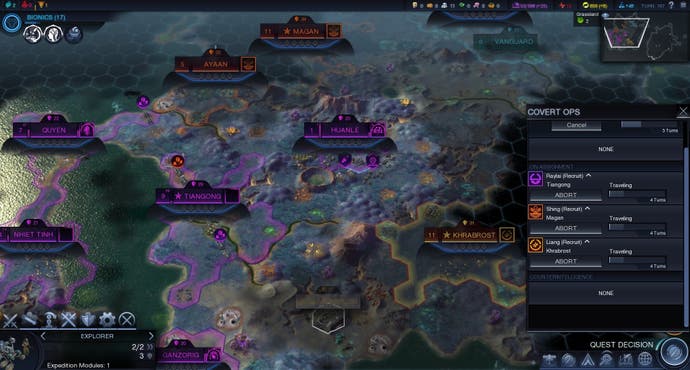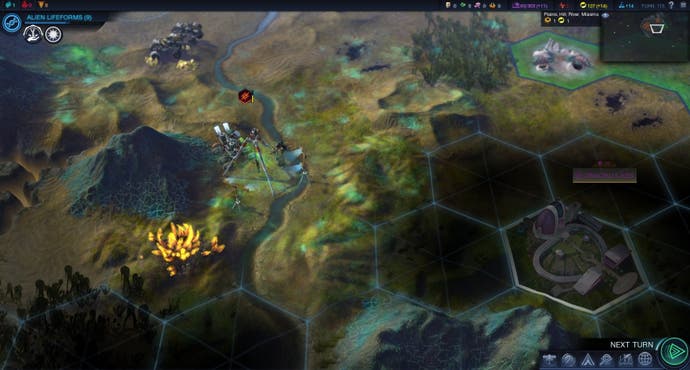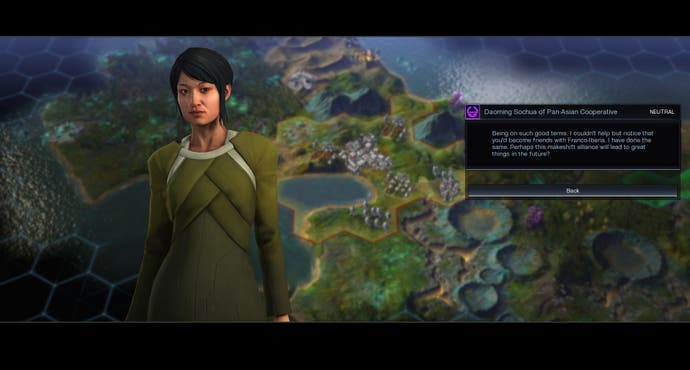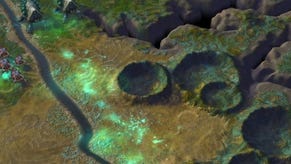Civilization: Beyond Earth makes the space race a marathon effort
Frontier living.
The overwhelming impression I get from Civilization: Beyond Earth is that interstellar pioneering is hard work. Firaxis has told us that starting a civilisation back on earth involves choices and opportunities. New beginnings are exciting and your people sprawl lazily across virgin lands like a cat on a sofa. Not so in space. Freedoms are replaced with responsibilities, possibilities with dangers. Almost from the moment you land on an alien world, you're beset on all sides by hostile alien life forms, hemmed in by a choking miasma and struggling to make sense of the things around you.
The preview build of Civilization: Beyond Earth that has been distributed to games journalists can be very hard indeed. It defaults to the second-lowest difficulty level and even this feels like more than enough of a challenge. It's not because the game is particularly smart, nor is it because AI factions are coy or aggressive or duplicitous. It's because there are quite a lot of things that are trying to kill you and beating them back requires a serious commitment of time and resources. Quite early on, you may well find yourself deciding between trying to expand, which will put you in constant conflict with the local lifeforms, or just throwing up some ultrasonic fences and building a single megacity until, in time, new resources and technology allow you to decisively beat back the frontier.
That's not the most exciting approach, as it buries you in build queues and limits you to scuttling back and forth across your tech web (more on that in a moment), but it's safe and much less stressful. Angry aliens are a fine match for any early military units that you churn out (produced, of course, at the expense of civic improvements and infrastructure), and these aliens reproduce about as quickly as you can build troops, bursting out of nests hidden in undiscovered territories.

Forays into the unknown are made more difficult by that ever-present miasma, which both harms your own forces and heals the aliens. Even if you find and eliminate an alien nest, something which is inevitably quite the battle of attrition, these nests sometimes reappear again anyway. In a magical reveal that would've impressed David Copperfield, one appeared two hundred turns into a game, next to a well-established city and right underneath one of my worker units.
Now I know that I've spent my first four paragraphs just talking about fighting indigenous lifeforms, but I really need to stress that these guys are persistent, sometimes forming throngs that remind me of the surging hordes of Warlock. Then there's the horrific siege worms, which have come surging out from the pages of a Frank Herbert epic. They tunnel about the map, smashing anything in their path and making exploration, cross-country and inter-city travel very difficult indeed. One of these tremendous horrors reduced my large and very well-developed capital to rubble in just a handful of turns.
So right away Civilization: Beyond Earth can feel like much more like a wargame than any of its terran cousins. The unwary player can easily suffer some serious early-game setbacks if they make poor tactical decisions. The temptation to turtle behind those ultrasonic fences, which prevent alien life from venturing too close to your city, is a strong one and it's not unwise. Later, you'll get the technology to (slowly) clear miasma, as well as units that, if not superior, are at least better in a fight, along with an infrastructure that can produce them faster than you lose them.

Pleasingly, there are other concerns beyond battle, and space offers all kinds of opportunities for stimulating scientific research. That twitch you feel at your toe is an advisor tugging at one strand of your tech web, a sprawl of captured concepts that, rather than Civilization's more linear trees, are interconnected and offer much more freedom of exploration. Each connection on this web isn't just a single technology, either, but made up of sub-categories which present greater specialisation.
It's an interesting and much more open approach to research, though it feels much less guided and, without the familiarity offered by technologies such as Iron Working or Steam Engines, it takes time to understand exactly what the benefits and context of each advancement might be, especially if they have a generic name, like "Physics." It's also where you're likely to have your first encounter with the game's concepts of Harmony, Purity and Supremacy.
As your colonists establish themselves, they'll explore these philosophies and the possibilities that come with them, deciding whether to conquer or co-exist on this new world. In time, this will specialise your military units and affect your overall outlook, though in the shortened preview build there's not so much of a chance to see exactly how well these work. What there is time to do is implement a variety of tinier tweaks that gradually customise your civilisation. Occasionally, prompts appear that ask you if you want particular structures to grant you certain bonuses, such as producing additional food or furthering your scientific research.

They're hardly game-defining decisions, but they do return to you a sense of individuality that you'll gradually lose after you make planetfall. Faction selection allows you to choose whether you begin with the ability to, say, detect alien nests, or foresee continental boundaries, as well as whether your bring scientists, artists or engineers with you, but these choices are very much stat bonuses and don't feel like anything more. Sure, that culture bonus you pick will better seed the culture trees you'll grow later, but it won't dramatically change how you play.
And I'm not yet sure what will change how you play, as my experience with each faction has been largely the same. The biggest concern for Civilization: Beyond Earth was always going to be whether it felt too much like Civilization, whether it would just seem like a sci-fi reskin, whether it would feel original enough in its concepts and its mechanics. At the moment, it's hard to tell. Amongst all that early game attrition, I'm still taking many of the same, familiar steps, just in a different pair of boots. Rival leaders are still the petulant toddlers that they are in Civilization, demanding so much and offering so little, but this time they're equally as hemmed in by the alien hordes as I am, frequently sending waves of units out to get massacred by giant space bugs. I'd love it if there was a way we could co-operate to clear miasma or fight back the hordes. They just want my metal resources.
My soldiers might as well be legions, buggies might as well be cavalry and when I wipe out an alien nest I gain another twenty-five energy, a currency resource which might as well be gold pieces. There's definite hints of strange developments to come, with mysterious signals to be decoded and increasingly abstract customisation options just over the horizon, but the preview build doesn't want to show me any of these.
What it does want to show me is yet another automated worker or trade convoy mindlessly driving into the mouth of a siege worm, or another structure or technology that, basically, means I can build other structures or technologies a little bit faster. Civilization: Beyond Earth may surprise me still, but I'm not yet seeing signs of a brave new world here, out among the stars. I'm seeing our own one reflected back at us.




